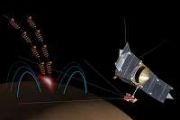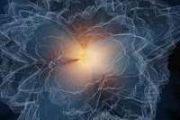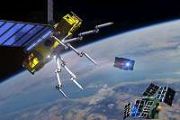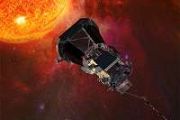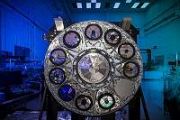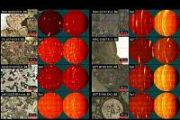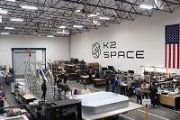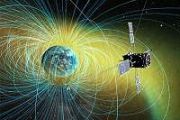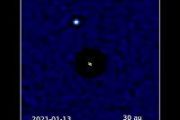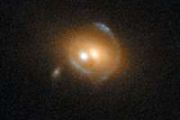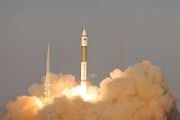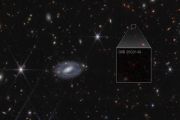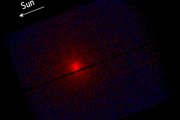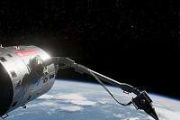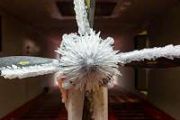
Copernical Team
Emergency detected in pre-moon landing maneuver by Russia's Luna-25 probe
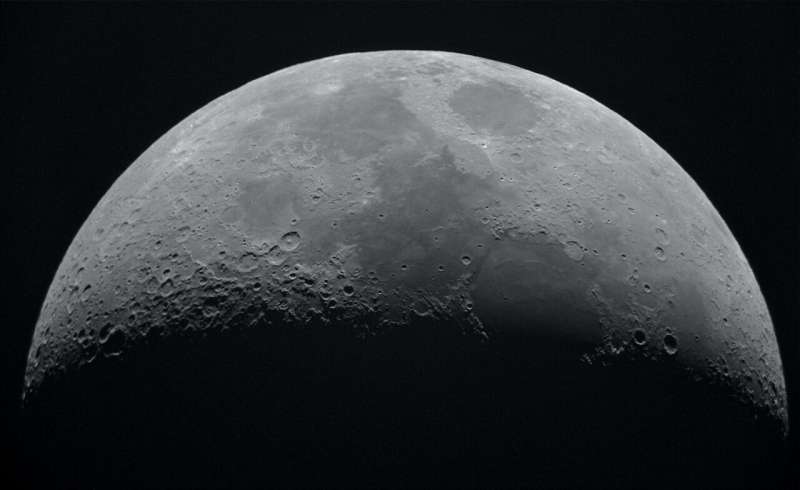
An "emergency" was detected on Saturday during a maneuver by Russia's Luna-25 probe prior to its Moon landing, Russian space agency Roscosmos said.
"Thrust was released to transfer the probe onto the pre-landing orbit," Roscosmos said in a statement.
"During the operation, an emergency situation occurred on board the automatic station, which did not allow the carrying out of the maneuver within the specified conditions."
The lander, Russia's first such mission in almost 50 years, was successfully placed in the Moon's orbit on Wednesday after being launched from the Vostochny cosmodrome in the country's Far East.
Roscosmos did not say if the incident would delay the landing, due to take place on Monday, north of the Boguslawsky crater on the lunar south pole.
In June, Roscosmos chief Yuri Borisov told President Vladimir Putin that such missions were "risky", with an estimated success probability of around 70 percent.
The probe is expected to stay on the Moon for a year, where it is tasked with collecting samples and analyzing soil.
Cameras installed on the lander have already taken distant shots of the Earth and Moon from space.
Hurricane Hilary Barrels Toward Baja California
 Hurricane Hilary, a category 4 storm in the Pacific Ocean, approached the Baja California peninsula on August 18, 2023.
The Visible Infrared Imaging Radiometer Suite (VIIRS) on the NOAA-20 satellite acquired this image of Hilary in the predawn hours of August 18 (09:25 Universal Time), when the eye of the storm was about 400 miles (640 kilometers) off the coast of the peninsula. The image
Hurricane Hilary, a category 4 storm in the Pacific Ocean, approached the Baja California peninsula on August 18, 2023.
The Visible Infrared Imaging Radiometer Suite (VIIRS) on the NOAA-20 satellite acquired this image of Hilary in the predawn hours of August 18 (09:25 Universal Time), when the eye of the storm was about 400 miles (640 kilometers) off the coast of the peninsula. The image From rice to quantum gas: China's targets pioneering space research
 China's orbiting Tiangong space station is now fully operational and has embarked on a mission that aims to achieve groundbreaking scientific discoveries, according to the China Manned Space Agency (CMSA). This marks a significant step forward as the station enters an application and development phase that is anticipated to last for over a decade.
The spokesperson for CMSA, Lin Xiqiang, re
China's orbiting Tiangong space station is now fully operational and has embarked on a mission that aims to achieve groundbreaking scientific discoveries, according to the China Manned Space Agency (CMSA). This marks a significant step forward as the station enters an application and development phase that is anticipated to last for over a decade.
The spokesperson for CMSA, Lin Xiqiang, re True Anomaly opens GravityWorks; gains federal clearances for space operations
 In a major advancement for space access and sustainability, tech firm True Anomaly, Inc. launched its advanced spacecraft manufacturing facility, GravityWorks, while simultaneously securing federal permissions for novel space operations.
Located in Centennial, Colo., this new facility positions True Anomaly amidst the flourishing aerospace and defense sectors of Colorado, one of America's
In a major advancement for space access and sustainability, tech firm True Anomaly, Inc. launched its advanced spacecraft manufacturing facility, GravityWorks, while simultaneously securing federal permissions for novel space operations.
Located in Centennial, Colo., this new facility positions True Anomaly amidst the flourishing aerospace and defense sectors of Colorado, one of America's Scientists use FAST to discover a new population of 'dwarf' pulses
 Using the Five-hundred-meter Aperture Spherical radio Telescope (FAST), a research team led by Prof. HAN Jinlin from the National Astronomical Observatories of the Chinese Academy of Sciences (NAOC) has detected distinct "dwarf pulses" from a bright pulsar PSR B2111+46, and studied the radio emission in unprecedented details and probed the unknown physics in the magnetosphere.
Pulsars gene
Using the Five-hundred-meter Aperture Spherical radio Telescope (FAST), a research team led by Prof. HAN Jinlin from the National Astronomical Observatories of the Chinese Academy of Sciences (NAOC) has detected distinct "dwarf pulses" from a bright pulsar PSR B2111+46, and studied the radio emission in unprecedented details and probed the unknown physics in the magnetosphere.
Pulsars gene Astronomers find progenitor of magnetic monster
 A team of researchers, including NOIRLab astronomer Andre-Nicolas Chene, has found a highly unusual star that has the most powerful magnetic field ever found in a massive star - and that may become one of the most magnetic objects in the Universe: a variant of a neutron star known as a magnetar. This finding marks the discovery of a new type of astronomical object - a massive magnetic helium sta
A team of researchers, including NOIRLab astronomer Andre-Nicolas Chene, has found a highly unusual star that has the most powerful magnetic field ever found in a massive star - and that may become one of the most magnetic objects in the Universe: a variant of a neutron star known as a magnetar. This finding marks the discovery of a new type of astronomical object - a massive magnetic helium sta New type of star gives clues to mysterious origin of magnetars
 Magnetars are the strongest magnets in the Universe. These super-dense dead stars with ultra-strong magnetic fields can be found all over our galaxy but astronomers don't know exactly how they form. Now, using multiple telescopes around the world, including European Southern Observatory (ESO) facilities, researchers have uncovered a living star that is likely to become a magnetar. This finding m
Magnetars are the strongest magnets in the Universe. These super-dense dead stars with ultra-strong magnetic fields can be found all over our galaxy but astronomers don't know exactly how they form. Now, using multiple telescopes around the world, including European Southern Observatory (ESO) facilities, researchers have uncovered a living star that is likely to become a magnetar. This finding m Cruising to the Contact: Sols 3921-3922
 Earth planning date: Wednesday, August 16, 2023: Curiosity had a successful drive on Monday and is now positioned at the transition between lighter and darker-toned materials with a myriad of exciting geologic targets to investigate in the coming sols, including dark-toned float rocks, bedrock near the contact between the sulfate unit and upper Gediz Vallis Ridge, and a cluster of texturally-div
Earth planning date: Wednesday, August 16, 2023: Curiosity had a successful drive on Monday and is now positioned at the transition between lighter and darker-toned materials with a myriad of exciting geologic targets to investigate in the coming sols, including dark-toned float rocks, bedrock near the contact between the sulfate unit and upper Gediz Vallis Ridge, and a cluster of texturally-div Rocket Lab inks dedicated launch deal with Japanese EO company iQPS
 In a recent development in the realm of Earth observation technology, Planet Labs PBC (NYSE: PL) has signed a contract to offer their global daily monitoring solution to a Ministry of Foreign Affairs in Asia. This high-value deal comes with a seven-figure annual contract value, emphasizing the significance of the collaboration.
For those unfamiliar with the industry backdrop, Planet Labs s
In a recent development in the realm of Earth observation technology, Planet Labs PBC (NYSE: PL) has signed a contract to offer their global daily monitoring solution to a Ministry of Foreign Affairs in Asia. This high-value deal comes with a seven-figure annual contract value, emphasizing the significance of the collaboration.
For those unfamiliar with the industry backdrop, Planet Labs s Scientists proposed to adapt a Mars ISRU system to the changing Mars environment
 Human missions to Mars necessitate an efficient launch system to ascend from the planet and rendezvous with Earth-bound return vehicles. The critical component for this ambitious task? Oxygen. Not only for ascent propellants but possibly also for life support.
To facilitate a crew of six astronauts, approximately 30 metric tons of oxygen propellants would be required for ascent. This signi
Human missions to Mars necessitate an efficient launch system to ascend from the planet and rendezvous with Earth-bound return vehicles. The critical component for this ambitious task? Oxygen. Not only for ascent propellants but possibly also for life support.
To facilitate a crew of six astronauts, approximately 30 metric tons of oxygen propellants would be required for ascent. This signi 


